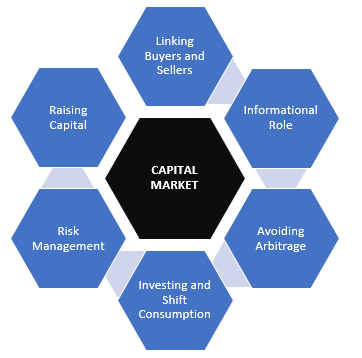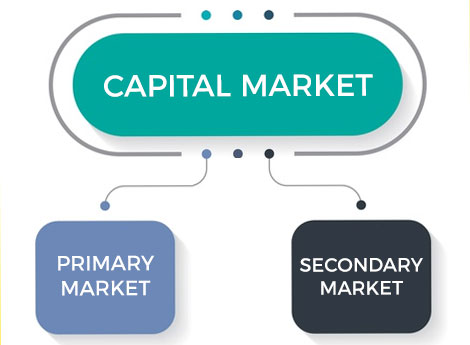This article outlines the functions of the capital market. A capital market is comprised of the debt and the equity market. It is the market where long term financial instruments are traded. These instruments include bonds, debentures, ordinary (equity) shares and preference shares. The term of these instruments is one year or longer whilst some instruments such as ordinary shares have no maturity date. There is a primary market where new listings take place, and a secondary market where previously issued instruments are traded. Investors, central government and various companies are some of the major players. These players borrow money for long-term activities or invest surplus funds for long periods of time. On the Capital market transactions are made either over the counter (OTC) or over electronic dealing platforms. The major functions of the capital market include the below.
Table Of Contents

Linking Buyers And Sellers
Linking buyers and sellers is a major function of the capital market. A market can only be called one when both buyers and sellers come together. The capital market links those with excess funds together with those in need of funds. That way idle resources are put to productive use in order to generate more income and increase productivity. Investors get more income in the form of dividends and interest payments. Through facilitating the sell and purchase of long-term financial instruments, the capital market reduces the cost and time of trading significantly. This is an important role of the capital market.
Raising Capital
Efficient markets create an easy access to capital. Raising capital is an essential function of the capital market. If a company requires funds through equity it can issue shares on the stock exchange. Some popular stock exchanges include NYSE (New York Stock Exchange), LSE (London Stock Exchange) and JSE (Johannesburg Stock Exchange). The capital market also caters for the financial needs of the various sectors of the economy by mobilising peoples’ savings through investment and lends that money for development projects. In addition, capital markets ensure the availability of funds in the economy by continuously providing long term investment avenues for investors.
Informational Role
One of the function of capital market is the informational role. The market price of a financial instrument, either new or existing is set by the capital market, thus the market mirrors the value of the instrument. Stock prices reflect investors’ collective evaluation of a company’s current and future performance. If the market is optimistic about a company, it will be shown by a rise in the stock price of that company. Thus, capital markets encourage the allocation of funds to firms that appear to have the best prospects. Keep in mind that no one knows with certainty which ventures will do well and which will not succeed. The informational role is an important function of the capital market.
Enables Investing
One of the core functions of capital markets is to enable investing in the capital market instruments. Capital markets create the opportunity to invest in different financial instruments such as bonds, ordinary shares and preference shares depending on the risk appetite of the investor. Buying these instruments and selling them again in the future is made much easier. Investing is a major role of the capital market.
Risk Management
The capital market helps investors reduce the risk of making losses in other financial instruments and commodities through diversification. Risk management is an essential function of the capital market. Investors can purchase bonds, preference shares and debentures along with common stock and other commodities in order to spread out risk. In fact, Governments bonds are regarded as risk free assets. In addition to diversification, the capital market helps with the allocation of risk by allocating investors with a high-risk appetite to more riskier investments and those who are risk averse to less riskier instruments. Risk tolerant investors purchase stocks whilst risk-averse investors purchase bonds. So one of the function of capital markets is risk management.
Prevents Arbitrage
The capital market also serves the function of avoiding arbitrage. A financial instrument should trade at the same price wherever transactions take place. The moment a financial instrument such as a stock trades at different prices in different locations speculators will try to make a risk-free profit. This happens when the instrument is bought at the lower price location and sold where the price is higher, this is referred to as arbitrage. When markets are not well developed this occurs often. However, well developed markets act as vehicles to create efficiency. Arbitrage opportunities do not last long. Eventually, the market will move back to equilibrium when high demand for the instrument in the cheaper location pushes the price up and excess supply of the instrument in the expensive location pushes the price down. Eliminating arbitrage is an essential function of the capital market.
Shift Consumption
The capital market also serves the function of shifting consumption. By storing one’s wealth in bonds or equity you shift your purchasing power from one period to another. Young working-class employees can invest their excess funds in the capital market during their high earning periods and later spend their yields during their low earning period, when they retire. The capital market allows investors to manage their consumption timing and pattern by apportioning funds for consumption in the appropriate period. Thus, the capital market enables people to separate decisions regarding current and future consumption. Managing of consumption is an important function of the capital market.
Other Functions of Capital Market
- It improves effectiveness in capital allocation
- The capital market leads to rapid economic growth
- Enables raising of capital
- It minimises transaction cost and information cost
- The capital market provides a variety of financial instruments to investors
- Provision of information on the value of a security
- The capital market offers liquidity to investors for their assets
- It offers insurance against the market threats through derivatives
- The capital market offers trading in securities
- It links savers and investors
- The capital market offers a valuation of financial instruments
Major Players In The Capital Market
Investors
These include Individuals, Investment Companies, Pension funds, Insurance companies. These parties invest in the equity market in order to;
- Earn good returns on the money Invested
- Gain control over the companies by buying the majority of shares
Companies
Companies list their shares on the equity market in order to;
- Obtain capital
- Increase liquidity of shares
- Obtain easier compensation for employees
Note: A company can only list on a stock exchange if it meets the listing requirements
Large companies also issue bonds known as corporate bonds in order to finance their activities or big projects. The issue of corporate bonds is expensive so only big corporations that require large sums of money can afford to issue them.
Central Government
Central Banks issue bonds frequently in order to finance the building of roads, bridges and other activities.
Other levels of government
Local governments municipalities and quasi government institutions can also issue bonds to finance their activities
Keywords
ARBITRAGE
Occurs when there are price discrepancies in markets such that a person can buy an instrument in one market and sell it at a higher price in another market.
ELECTRONIC DEALING PLATFORMS
A formal financial market usually governed by specific legislation.
EQUITY
An ownership share in a company such as ordinary shares also known as common stock
FINANCIAL INSTRUMENTS
Claims on real assets or the income generated by them
INVESTMENT
A commitment of current resources in the expectation of obtaining future benefits
OTC (Over the Counter)
An over the counter transaction is a transaction that does not take place on an exchange
PRIMARY MARKET
Where new listings are issued and sold
SECONDARY MARKET
Where the trading of previously issued shares takes place
